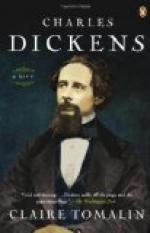On Wednesday, June 8th, he seemed in excellent spirits; worked all the morning in the Chalet[35] as was his wont, returned to the house for lunch and a cigar, and then, being anxious to get on with “Edwin Drood,” went back to his desk once more. The weather was superb. All round the landscape lay in fullest beauty of leafage and flower, and the air rang musically with the song of birds. What were his thoughts that summer day as he sat there at his work? Writing many years before, he had asked whether the “subtle liquor of the blood” may not “perceive, by properties within itself,” when danger is imminent, and so “run cold and dull”? Did any such monitor within, one wonders, warn him at all that the hand of death was uplifted to strike, and that its shadow lay upon him? Judging from the words that fell from his pen that day we might almost think that it was so—we might almost go further, and guess with what hopes and fears he looked into the darkness beyond. Never at any time does he appear to have been greatly troubled by speculative doubt. There is no evidence in his life, no evidence in his letters, no evidence in his books, that he had ever seen any cause to question the truth of the reply which Christianity gives to the world-old problems of man’s origin and destiny. For abstract speculation he had not the slightest turn or taste. In no single one of his characters does he exhibit any fierce mental struggle as between truth and error. All that side of human experience, with its anguish of battle, its despairs, and its triumphs, seems to have been unknown to him. Perhaps he had the stronger grasp of other matters in consequence—who knows? But the fact remains. With a trust quite simple and untroubled, he held through life to the faith of Christ. When his children were little, he had written prayers for them, had put the Bible into simpler language for their use. In his will, dated May 12, 1869, he had said, “I commit my soul to the mercy of God through our Lord and Saviour Jesus Christ, and I exhort my dear children humbly to try to guide themselves by the broad teaching of the New Testament in its broad spirit, and to put no faith in any man’s narrow construction of its letter here or there.” And now, on this last day of his life, in probably the last letter that left his pen, he wrote to one who had objected to some passage in “Edwin Drood” as irreverent: “I have always striven in my writings to express veneration for the life and lessons of our Saviour—because I feel it.” And with a significance, of




